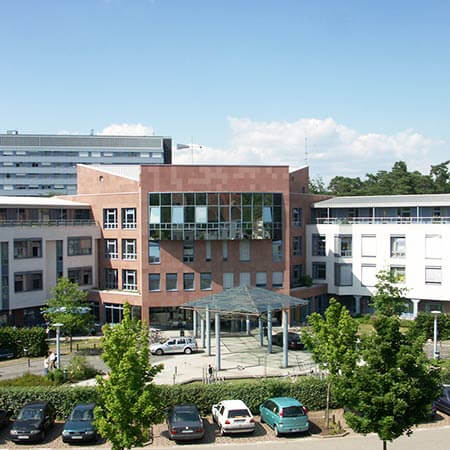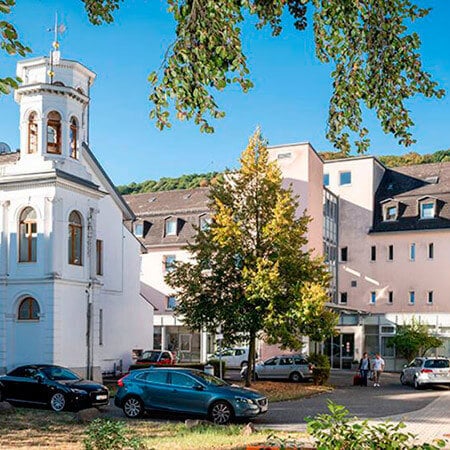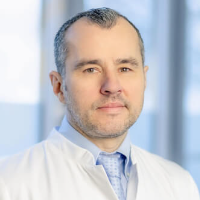Venous Malformation — Venous Embolization: treatment in the Best Hospitals of Germany
Treatment prices are regulated by national law of the corresponding countries, but can also include additional hospital coefficients. In order to receive the individual cost calculation, please send us the request and medical records.

Department of Interventional Neuroradiology
The Department of Interventional Neuroradiology offers the full range of services in the areas of its specialization. The medical facility provides imaging diagnostics and low-traumatic image-guided interventional treatment of nervous system diseases. The department's specialists have rich experience and exceptional professional skills in the field of interventional procedures for acute and chronic vascular diseases, such as ischemic strokes, brain hemorrhages, cerebral artery stenosis, brain aneurysms, and vascular malformations. The department's neuroradiologists cooperate closely with neurologists and neurosurgeons so that each patient receives an optimal treatment regimen based on the expert opinions of the specialists. The department's medical team has state-of-the-art computed tomography (CT), magnetic resonance imaging (MRI), and MR angiography systems that are actively used for diagnosing patients and therapeutic procedures. Medical care is provided in compliance with current clinical protocols. The department also offers many outpatient medical services, which is an advantage for many patients.




Department of Interventional Radiology
The Department of Interventional Radiology offers the full range of modern diagnostic procedures using ionizing radiation, image-guided tissue sampling (biopsy), and minimally invasive therapeutic procedures. Patients may be seen on an inpatient or outpatient basis. To achieve optimal results, the department works closely with specialists in radiation therapy, oncology, neurology, neurosurgery and neuro-oncology, as well as urology, orthopedics, pain management, and palliative care. This collaboration helps ensure an accurate diagnosis and the most effective treatment.





Department of Diagnostic and Interventional Radiology, Nuclear Medicine
The Department of Diagnostic and Interventional Radiology, Nuclear Medicine offers the full range of diagnostic and therapeutic procedures in the areas of its specialization. The department has high-tech equipment for all types of modern imaging tests, image-guided therapeutic procedures, as well as radioisotope examinations and treatment of thyroid diseases using radioiodine therapy. The patients are provided with both inpatient and outpatient medical care. However, hospitalization is usually required only in the case of complex therapeutic interventions. The patients' health is in the good hands of the highly qualified doctors. The specialists regularly undergo advanced training courses, attend medical congresses and symposia, where they find out about innovations in the area of their specialization and share their experience with colleagues. To provide maximum safety for patients, the department strictly adheres to radiation protection standards.




The venous malformation is a congenital anomaly of the venous system, which leads to the violation of the structure of the vascular system. Pathology is rare and has many different forms.
Overview
One of the most difficult tasks in vascular medicine is the treatment of congenital venous malformations. The incidence is estimated at about 1-2 cases per 10,000 newborns. About 90% of venous malformations occur spontaneously, without obvious causes, in the form of localized lesions. Venous malformations in several different locations are detected in patients with rare hereditary forms of the disease. These include mucosal venous malformation and glomuvenous malformation, as well as two even more rare forms, i.e. multifocal venous malformation and blue rubber bleb nevus syndrome (Bean syndrome).
Venous malformations are a composite group of various diseases. Their common feature is the abnormal development of venous tissue. In this regard, the stages of each type of pathology are different, but all diseases are characterized by a slow progression of the process. The development of venous malformations depends on many factors, including the volume and rate of growth of veins, their localization, the degree of penetration into the surrounding tissues and organs, and concomitant diseases.
Venous malformations are connected with congenital and genetic defects in the development of the muscle layer of the veins, which lead to the expansion and dysfunction of the venous system. As a rule, venous malformations are diagnosed at birth and grow with the development of the child. But it happens that clinically obvious signs may appear later. The disease progresses slowly (over decades). Puberty sometimes accelerates the development of venous malformations, especially when they are localized intramuscularly. Depending on the location and volume of the pathological process, the symptoms of venous malformations may be different. They may include pain, bleeding, cosmetic defects, and functional impairment that can significantly influence the quality of life, lead to complications, disability, and death.
The occurrence of venous malformations is associated with genetic disorders. Laboratory studies reveal mutations in genes responsible for the development of the inner and muscular layers of the venous vessels. Some types of mutations are inherited. Genetic abnormalities lead to localized defects in vascular development during vasculogenesis and especially during angiogenesis. Vasculogenesis is the first stage in the formation of blood vessels during the embryonic period, defined as the growth of vessels from embryonic cells. During vasculogenesis, the precursors of endothelial cells (angioblasts) migrate and differentiate to form unilamellar capillaries. With further angiogenesis, the capillary network lengthens and expands.
Venous malformations develop mainly in the skin, subcutaneous tissue, or mucous membranes, although they can affect any tissue, including muscles, joints, internal organs, and the central nervous system. Approximately about 40% of venous malformations occur in the limbs, about 20% – in the trunk, and about 40% – in the cervicofacial region. The vast majority of them are located in one body region. Only about 1% of venous malformations are multiple, involving the skin and internal organs in the pathological process at once.
Symptoms
Venous malformations are usually soft subcutaneous formations that appear as a change in skin color from light to dark blue. Clinical manifestations can vary greatly depending on the size, location, and degree of compression of adjacent tissues. In the severe cases cervicofacial venous malformations can lead to disfigurement, facial asymmetry, displacement of the eyeballs, or malocclusion.
A common complaint of patients is permanent pain that is associated with damage to the joints, tendons, or muscles. It can worsen during puberty, with intense exercise or menstruation. The pain syndrome is more severe in the morning hours, apparently due to venous congestion and edema.
Venous malformations in the temporal muscle often lead to migraines. Damage to the oral cavity, including the tongue, causes difficulty speaking and chewing. Venous malformations that develop in the extremities cause muscle weakness, changes in the length of the extremities, and their underdevelopment.
In some patients with venous malformations varicose of the superficial veins is observed, especially when localized on the extremities. This is usually a characteristic of extensive lesions.
Common complications of venous malformations include:
- Trophic disorders, including open ulcers
- Bone fractures
- Thrombosis
- Bleeding
- Anemia
- Compression of surrounding tissues and organs
- Dysfunction of internal organs and limbs
- Cosmetic defects
Diagnostics
The venous malformation manifests itself by a change in skin color to dark blue and soft formations in the subcutaneous tissue present from birth or early childhood. An additional sign of the diagnosis is slow development during life or dramatic growth that is caused by puberty, trauma, exercise, or menstrual period. Considering the hereditary nature of the disease, it is important to collect family history.
The clinical diagnosis making is based on visualization of the lesion and physical examination data:
- Common signs of venous malformations range from small varicose veins to extensive lesions of the face, limbs, or trunk
- When compressed, the veins are less visible in an upright position
- Stress, mental or physical, enlarges the veins
- Due to the slow blood flow, there may be impairment of hearing and poor tactile sensitivity
Additional examination methods for detecting superficial and small lesions are usually not required. In the case of multiple lesions, imaging methods that are used to assess the condition of bone tissue during the treatment planning include:
- Ultrasound examination and magnetic resonance imaging (MRI) for the initial diagnosis making
- X-ray examination to detect phleboliths that are usually typical for venous malformations
- Computed tomography (CT) to assess bone tissue
- Phlebography (introduction of a radiopaque substance into the lumen of the veins) for treatment planning
Treatment
Embolization is a minimally invasive endovascular intervention, which consists of excluding abnormal vascular formation from the bloodstream with the help of a special material.
Venous malformations are subject to surgical treatment. To date, the modern technique of vein embolization has successfully proven its effectiveness in the world. The vein embolization is performed in order to "turn off" a pathological tangle of blood vessels. Vein embolization reduces (or completely excludes) the risk of developing a hemorrhagic stroke. At the same time, unlike neurosurgical interventions, vein embolization is performed through a small puncture in the femoral artery.
Modern achievements of nuclear medicine allow considering this method as the first step in the treatment of diseases such as arteriovenous malformations and venous malformations.
Vein embolization is a minimally invasive procedure that stops blood supply to the tumor, which leads to the restriction of its growth.
Through a puncture, access to the volumetric formation is provided. Vein embolization is painless and usually performed without the use of anesthesia, but can sometimes be performed under local anesthesia.
During vein embolization, the surgeon brings a special microcatheter to the malformation and then uses platinum coils or adhesive compositions to "disconnect" the malformation from the bloodstream. This prevents their further growth and the risk of rupture.
Vein embolization is used as an independent treatment method, as well as the first stage of tumor removal.
Sometimes intravascular interventions on venous malformations prepare patients for the subsequent more radical interventions, i.e. removal or irradiation. Four types of intravascular interventions for venous malformations are distinguished. The first one is curative embolization – as a result of one or several procedures a radical occlusion of the malformation is achieved. The second one is preoperative embolization, i.e. reduction of the size of the malformation or obliteration of "dangerous" veins on the eve of surgical removal. The third one is preradiosurgical – a decrease in the volume of the venous malformation is achieved in order to facilitate subsequent radiosurgery. The forth one is palliative – partial obliteration of the malformation in order to minimize the risk of hemorrhage or relieve clinical manifestations. The maximum vein embolization effect is achieved when the procedure is part of a multi-stage treatment scheme for the particular patient.
The technique of vein embolization is mainly determined by the size, localization, and features of venous malformation. Vein embolization may solve one of the following tasks: reduction of the malformation’s volume for the subsequent radiosurgical treatment; reduction of blood flow to ensure greater safety of radical removal; turning off the feeding vessels that are difficult to access with direct intervention; exclusion of areas that have high risks of the rupture. Unlike permanent or complete embolization, partial or temporary embolization does not exclude the risk of hemorrhage completely; it still develops in about 3% of cases.
Vein embolization of venous malformations is a modern and effective method of treating this pathology. Quick recovery and rehabilitation after vein embolization allow patients to return to their daily life in a couple of days.
Where can I undergo vein embolization in Germany?
Health tourism is becoming more and more popular these days, as medicine in Germany often ensures a much better quality of vein embolization.
The following hospitals in Germany show the best success rates in vein embolization:
- University Hospital Saarland Homburg
- University Hospital Halle (Saale)
- University Hospital Muenster
- University Hospital Oldenburg
- Charite University Hospital Berlin
You can find more information about the hospitals in Germany on the Booking Health website.
The cost of treatment in Germany
The prices in hospitals listed on the Booking Health website are relatively low. With Booking Health, you can undergo vein embolization at an affordable price.
The cost of treatment in Germany varies, as the price depends on the hospital, the specifics of the disease, and the complexity of its treatment.
The cost of treatment of vein embolization in Germany is about 16,203-33,997 EUR.
You might want to consider the cost of possible additional procedures and follow-up care. Therefore, the ultimate cost of treatment in Germany may differ from the initial price.
To get the correct information about the overall cost of treatment in Germany, contact us by leaving the request on the Booking Health website.
How can I undergo vein embolization in Germany?
It is not easy to self-organize any treatment abroad. It requires certain knowledge and expertise. Thus, it is safer, easier, and less stressful to use the services of a medical tourism agency.
As the largest and most transparent medical tourism agency in the world, Booking Health has up-to-date information about vein embolization in the best hospitals in Germany. We will help you select the right clinic taking into account your wishes for treatment.
We want to help you and take on all the troubles. You can be free of unnecessary stress, while Booking Health takes care of all organizational issues regarding the treatment in Germany. Our services are aimed at undergoing vein embolization safely and successfully.
Medical tourism can be easy! All you need to do is to leave a request on the Booking Health website, and our manager will contact you shortly.

